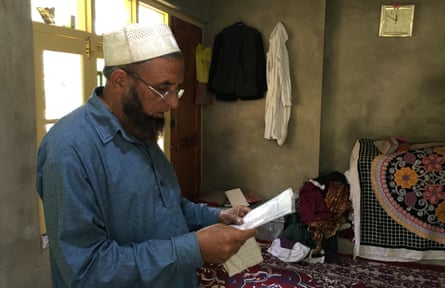Babawayil, in the foothills of the Zabarwan mountains by the Sind River, is a typical village in Indian-administered Kashmir. Groups of men and women sit on their lawns breaking open green husks of walnuts, freshly gathered from the giant trees shading the sleepy hamlet. Other villagers are busy in the paddy fields bringing in the harvest. Harud, the harvest season, is usually busy.
Most of the 150 households make their living from farming and weaving pashmina shawls.
The village, however, is one of the rare places in south Asia that has banned dowries and abandoned the custom of throwing lavish weddings.
Weddings in this part of the world are usually expensive and can cost a family’s life savings. Money is spent on elaborate meals served to hundreds of guests – relatives, friends and neighbours.
As part of the dowry, the bride’s family gives gifts – household appliances, jewellery, cash and sometimes even a car for the groom. Often, the wedding happens only after the dowry is fixed.

Dowries have been illegal in India for the past six decades, but the custom is deeply entrenched. An estimated 20 women a day are murdered or kill themselves in the country because of dowry demands. Every year there are more than 8,000 “dowry deaths”.
“The stories reaching here about dowry and expensive weddings were disturbing,” said Bashir Ahmad, imam of the village mosque. “I would always wonder how we would be able to marry our children with these traditions.”
Ahmad was among 20 village elders who met in the winter of 2004 to discuss how these “evil customs” could be stopped. After days of deliberation, the elders presented their ideas to villagers.
They proposed that the bride’s family would not pay anything towards the wedding. The groom’s family would pay 900 Indian rupees (£9) as mehr – an Islamic obligation that the groom has to pay to the bride in the form of money or possessions when they marry – and 15,000 rupees (£150) to the bride’s family. The groom would arrange for 50kg (110lb) of meat and 40kg of rice for the wedding feast, and only 40 people from the groom’s side were allowed to attend.
Previously, hundreds of guests could sit down to the wazwan, a multicourse feast of Kashmiri cuisine served at weddings, and dowries could reach hundreds of thousand of rupees.

Villagers were quick to accept the new rules. Since then, there have been no expensive weddings held in Babawayil and no dowries have been given.
Last year, villagers updated the regulations: the groom’s family now has to pay 50,000 rupees (£500) to the bride’s family, which includes 20,000 of mehr, to account for inflation. There is no wedding feast – only dates and tea can be served – and just three people are allowed to accompany the groom.
“I am proud that everyone in the village is following these laws,” said Ahmad, whose two sons and two daughters have married in the last few years.
The villagers say there has not been a single reported case of violence or abuse against a woman since the rules were introduced, and there have been no divorces.
There is also peer pressure to follow the rules. Ahmad says anyone who does not abide by them is ostracised in the community.
“Our inspiration comes from our religion,” says Iqra Altaf, 25, a postgraduate student who recently got married.

“Customs like dowry and lavish weddings are only making the life of women difficult,” she said. “It is leading to crimes and discrimination against women, even people do not want to have a girl child because of these issues. We have to end this menace.”
Altaf says she asked her husband to spend even less on their wedding than the rules allowed, to set an example to others.
Villagers say they are happy to see how the community has changed for the better. “We are content that our daughters would not face any harassment. And people who would otherwise spend huge sums of money on marriages are actually spending their savings on fruitful things like better education for their children,” said Ghulam Nabi Shah, 65, a retired government official from the village.
“I am trying to convince my relatives in other villages to keep weddings simple … I want to see Kashmir changing before I leave this world.”
